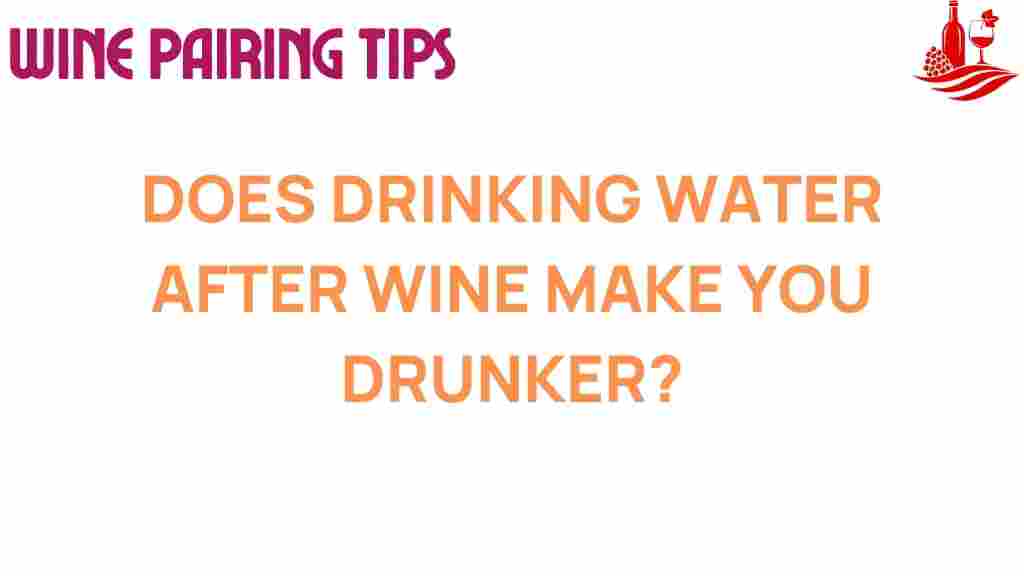Does Drinking Water After Wine Actually Make You Drunker?
When it comes to enjoying a glass of wine, many people have heard various tips and tricks to manage the effects of alcohol. One common belief is that drinking water after consuming wine can actually make you feel drunker. But is this true? In this article, we will explore the relationship between drinking water, wine effects, and hydration, addressing the myths surrounding alcohol absorption and sobriety.
The Science of Alcohol Absorption
To understand whether drinking water affects your level of intoxication, it’s important to first grasp how alcohol absorption works. When you consume wine, the alcohol enters your bloodstream through the stomach and small intestine. Here are some key points about alcohol absorption:
- Rate of Absorption: The rate at which alcohol is absorbed can be influenced by several factors, including the type of beverage consumed, the presence of food in the stomach, and individual metabolic rates.
- Hydration Levels: Being well-hydrated can potentially slow the absorption of alcohol, as water dilutes the alcohol concentration in your stomach.
- Body Weight: Heavier individuals may metabolize alcohol more efficiently than lighter individuals, affecting the overall experience.
So, how does drinking water fit into this equation? Let’s break it down further.
Understanding Hydration and Alcohol Effects
Hydration plays a crucial role in how alcohol affects your body. Here are some insights:
- Dehydration and Hangovers: Alcohol is a diuretic, meaning it can lead to increased urination and dehydration. This dehydration is a significant factor in hangover symptoms.
- Staying Hydrated: Drinking water while consuming wine can help mitigate some negative effects of alcohol, such as headaches and dizziness, by keeping you hydrated.
- Myth Busting: The idea that drinking water after wine makes you drunker is a myth. In fact, it might help you feel better by countering dehydration.
Step-by-Step: How to Drink Wine Responsibly
To enjoy wine while minimizing adverse effects, consider the following steps:
- Choose Quality Over Quantity: Opt for a small amount of quality wine instead of drinking larger quantities of lower-quality options.
- Stay Hydrated: For every glass of wine, drink a glass of water. This will help maintain hydration levels.
- Eat Before and While Drinking: Consuming food can slow the absorption of alcohol, allowing you to enjoy your wine without feeling overly intoxicated.
- Know Your Limits: Pay attention to your body and understand your limits. If you start feeling tipsy, consider switching to water.
Common Myths About Drinking Water and Wine
As mentioned, there are several myths about drinking water and wine consumption. Here are some common misconceptions:
- Myth 1: Drinking water after wine makes you drunker.
Fact: Water helps with hydration and does not increase alcohol absorption. - Myth 2: You should never mix water with wine.
Fact: Mixing water with wine can help you stay hydrated. - Myth 3: All wines lead to the same level of intoxication.
Fact: Different wines have different alcohol content and effects on the body.
Troubleshooting Tips for Managing Alcohol Effects
If you find yourself feeling too intoxicated after drinking wine, here are some tips to help you manage the situation:
- Drink Water: Start drinking water immediately to help rehydrate your body.
- Eat Something: Consuming food can help slow the absorption of alcohol and may help you feel better.
- Rest: Take a break and allow your body some time to process the alcohol.
- Seek Help if Needed: If you feel excessively drunk, consider asking a friend for assistance or calling a cab.
Health Considerations and Wine Consumption
While moderate wine consumption can have some health benefits, it is essential to understand the risks associated with alcohol. Here are some health considerations:
- Moderation is Key: The key to enjoying wine without adverse effects is moderation. Limit your intake to one or two glasses.
- Understand Your Body: Everyone metabolizes alcohol differently. Be aware of how your body reacts to wine.
- Consult with a Doctor: If you have health concerns or conditions that may be affected by alcohol, speak with your healthcare provider.
Conclusion
In summary, the notion that drinking water after wine can make you drunker is simply a myth. Staying hydrated while enjoying wine can actually help mitigate some of the negative effects of alcohol and enhance your overall experience. By understanding the science of alcohol absorption and following the tips outlined in this article, you can enjoy wine responsibly while prioritizing your health.
For further reading on wine consumption and health, check out this resource.
Remember, always listen to your body and drink responsibly!
This article is in the category Tips and created by Wine Pairing Tips Team
